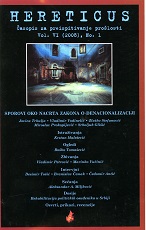Srbija između (kvazi)tradicije i (post)modernizacije
Serbia between (quasi) tradition and (post) modernisation
Author(s): Krstan MaleševićSubject(s): Social Sciences
Published by: Centar za unapređivanje pravnih studija
Keywords: (quasi)tradition; (post)modernisation; transition Serbia; Serbian society
Summary/Abstract: On reader's possible question of why is it necessary to discuss the relationship between the tradition and the modernity - here and now - the answer is simple: In addition to this being an "eternal question" (dating back to Ancient Greece and Rome) one can, on daily basis, witness numerous examples that clearly indicate the current actualisation of this relationship in its most disastrous forms. As so many times before in its history Serbia finds itself again on a big crossroad between (possible) European (post)modern future and a xenophobic, nationalist and tribal-collectivist past. Although this dilemma seems to be resolved on the (official) external political level in favour of (pro) European Serbia, the internal level of analysis suggests much more complex picture. The study of different layers of social reality (including the normative and societal levels) points towards conflicting visions of the Serbian present and future. So what is really happening with Serbian society? In which direction in Serbia headed? These questions are directly related to attitudes and values towards the tradition. In other words these questions are deeply linked to aggressively re-actualised traditional contents which not only do not correspond with the processes of democratic (post) modernization, but often stand in stark opposition to these very processes. The tradition under critique here mostly belongs to the worst part of our tradition or even "invented tradition", that is quasi-tradition. Rooted in the lack of basic knowledge this form of quasi-tradition is often nothing more than an instrument of the crude manipulation of the popular folk tradition. Supported intensively by the mass media these quasi traditional forms find their expression in "organic collectivism", ethno-philetism, clericalism, patriarchal totalitarianism, philistine spirit, xenophobia, spite, extremism and varieties of primitivism and profanity. Just as in previous historical periods this time again patriarchal culture, religious conservatism and political extremism go hand in hand. The central question here is how one can renew and articulate in the public discourse those segments of our tradition which are rooted in rationalism, Enlightenment and are based on liberal and universal values including tht openness towards the Other and different. It is these values that can certainly constitute the backbone of the processes of (post)modernisation of Serbia.
Journal: HERETICUS - Časopis za preispitivanje prošlosti
- Issue Year: 2008
- Issue No: 1
- Page Range: 149-167
- Page Count: 19
- Language: Serbian

